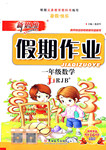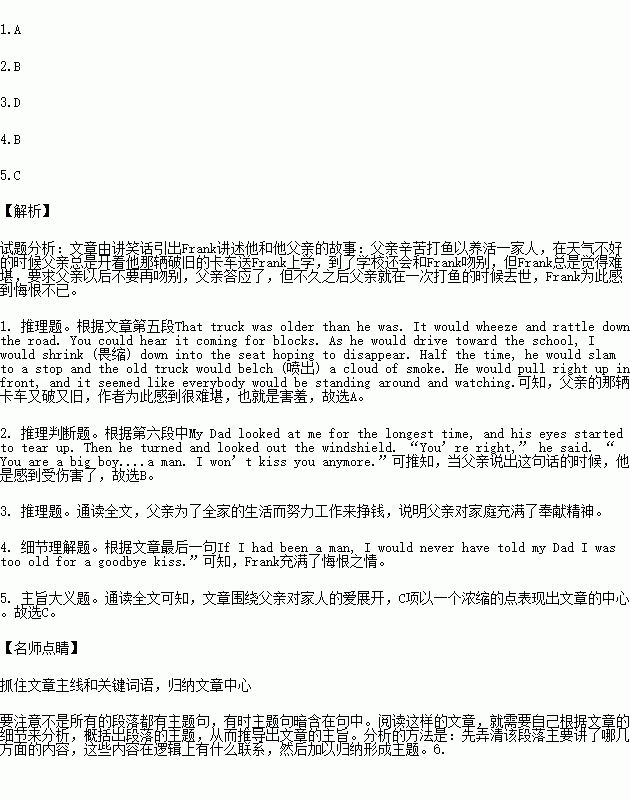题目内容
The Board Meeting had come to an end. Bob started to stand up and knocked into the table, spilling his coffee over his notes. “How embarrassing! I am getting so clumsy in my old age.”
Everyone had a good laugh, and soon we were all telling stories of our most embarrassing moments. It came around to Frank who sat quietly listening to the others. Someone said, “Come on, Frank. Tell us your most embarrassing moment.”
Frank laughed and began to tell us of his childhood. “I grew up in San Pedro. My Dad was a fisherman, and he loved the sea. He had his own boat, but it was hard making a living on the sea. He worked hard and would stay out until he caught enough to feed the family. Not just enough for our family, but also for his Mom and Dad and the other kids that were still at home.”
He looked at us and said, “I wish you could have met my Dad. He was a big man, and he was strong from pulling the nets and fighting the seas for his catch. When you got close to him, he smelled like the ocean. He would wear his old canvas, foul-weather coat and his bibbed overalls. His rain hat would be pulled down over his brow. No matter how much my mother washed them, they would still smell of the sea and of fish.”
Frank’s voice dropped a bit. “When the weather was bad he would drive me to school. He had this old truck that he used in his fishing business. That truck was older than he was. It would wheeze and rattle down the road. You could hear it coming for blocks. As he would drive toward the school, I would shrink (畏缩) down into the seat hoping to disappear. Half the time, he would slam to a stop and the old truck would belch (喷出) a cloud of smoke. He would pull right up in front, and it seemed like everybody would be standing around and watching. Then he would lean over and give me a big kiss on the cheek and tell me to be a good boy. It was so embarrassing for me. Here, I was twelve years old, and my Dad would lean over and kiss me goodbye!”
He paused and then went on, “I remember the day I decided I was too old for a goodbye kiss. When we got to the school and came to a stop, he had his usual big smile. He started to lean toward me, but I put my hand up and said, “No, Dad.” It was the first time I had ever talked to him that way, and he had this surprised look on his face. I said, “Dad, I’m too old for a goodbye kiss. I’m too old for any kind of kiss.” My Dad looked at me for the longest time, and his eyes started to tear up. Then he turned and looked out the windshield. “ You’re right,” he said. “ You are a big boy....a man. I won’t kiss you anymore.”
Frank got a funny look on his face, and the tears began to well up in his eyes, as he spoke. “It wasn’t long after that when my Dad went to sea and never came back. It was a day when most of the fleet (船队) stayed in, but not Dad. He had a big family to feed. They found his boat adrift with its nets half in and half out. He must have gotten into a strong wind and was trying to save the nets and the floats.”
I looked at Frank and saw that tears were running down his cheeks. Frank spoke again. “Guys, you don’t know what I would give to have my Dad give me just one more kiss on the cheek…to feel his rough old face… to smell the ocean on him… to feel his arm around my neck. I wish I had been a man then. If I had been a man, I would never have told my Dad I was too old for a goodbye kiss.”
1.When his father drove him to the school, Frank would shrink down into the seat hoping to disappear because ________.
A. he was ashamed of his father’s old truck
B. he thought he was old enough to go to school alone
C. he didn’t want his schoolmates to see his father
D. he hated the way his schoolmates stared at his father
2.In Frank’s eyes, when his father said “You are a big boy… a man.”, he probably felt ________.
A. disappointedB. hurtC. excitedD. proud
3.According to the story we can conclude that Frank’s father ________.
A. was quite confident in his skills in fishing
B. loved his children but hardly expressed it
C. seldom gave up faced with challenges
D. was full of devotion to his family
4.By saying the sentence “I wish I had been a man then…”, Frank meant ________.
A. he was fed up with his father kissing him goodbye
B. he deeply regretted what he had done to his father
C. he was then too young to refuse a goodbye kiss
D. he hoped that his father would forgive him
5.Which of the following may be the best title for this passage?
A. The Smell of the Ocean
B. We All Need Love
C. A Goodbye Kiss
D. Father’s Embarrassment
 新思维假期作业暑假吉林大学出版社系列答案
新思维假期作业暑假吉林大学出版社系列答案
